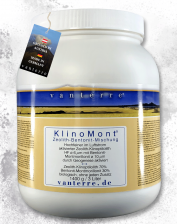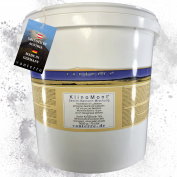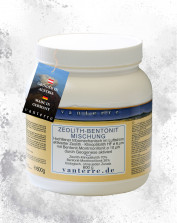KlinoMont® - Zeolite - Bentonite - Mixture
KlinoMont® - ZEOLITE - BENTONITE - THE MIXTURE
Why mix Zeolite and Bentonite? Because they complement each other excellently! More than the sum of their parts!
70 % Zeolite Clinoptilolite ø 6 µm, mikronized in the air flow with 30% Bentonite Montmorillonite, ø 10 µm, hot milled in the ball mill and dried.
When it comes to minerals that go hand in hand, these two are it! The slightly "rougher" Zeolite as a crystalline and the soft, gentle Bentonite as a layered clay mineral, capable of forming a protective film on the mucous membranes and binding mycotoxins even better than Zeolite. Together, they make an excellent third option in this area. Professionally mixed in a ratio of 70:30, there is no need to hydrate the Bentonite, as the particles are so finely mixed that clumps hardly form. However, the availability of the Bentonite activated by geogenesis from the Aegean Sea is unfortunately exhausted, and our specialty supplier for this mineral has informed us that no Bentonite of this quality is available anywhere in Europe. Our supplier certifies the Bentonite as a pharmaceutical auxiliary substance and also does not want to use any Bentonite activated by chemical processes. Therefore, we now have Bentonite from Fort Benton, Montana, the original location of this mineral. However, mixing with this Bentonite is a little harder than before. It is not as easily soluble in water as the other, all mixing attempts in the plant result in a completely homogeneous mixture, but it acts a little "picky" in liquids. We do not want to withhold this from you, but quality is always the most important.
The mixture of Zeolite Clinoptilolite and Bentonite Montmorillonite, 70:30, combines the advantages of both minerals. In this way, it is more than the sum of both parts. It has the advantage of two completely different materials (layered clay mineral and rock mineral), both of which are aluminosilicates and ion exchangers with extremely strong adsorption capacity. Since adsorption always takes place on the surface, the ultrafine micronization of both minerals is of great advantage. Of course, both minerals are without nanoparticles or any other additives. Bentonite Montmorillonite, like Zeolite Clinoptilolite, is an aluminosilicate, but is often underestimated. It has some properties that Zeolite does not have. One of the most essential is: Bentonite Montmorillonite, due to its strong swelling capacity and its huge active surface, forms a gel protective film on the mucous membranes, such as oral mucosa, esophagus, gastric mucosa, and intestine. Its specific surface can easily reach a size of 500-700m2 per gram. This creates a selective protective shield against toxins, heavy metals, and other pollutants that cannot enter the bloodstream. The metabolism and the organism are relieved and strengthened. In addition, Bentonite Montmorillonite has a very strong mycotoxin adsorption capacity. Another important thing to consider is that our Zeolite Bentonite mixture is so well mixed in a professional mixing plant that almost no Bentonite clumps should form when stirred into water. A very important feature of this mixture, considering that pure Bentonite - Montmorillonite must swell in water for hours before it dissolves. However, the availability of the Bentonite activated by geogenesis from the Aegean Sea is unfortunately exhausted, and our specialty supplier for this mineral has informed us that no Bentonite of this quality is available anywhere in Europe. Our supplier certifies the Bentonite as a pharmaceutical auxiliary substance and also does not want to use any Bentonite activated by chemical processes. Therefore, we now have Bentonite from Fort Benton, Montana, the original location of this mineral. However, mixing with this Bentonite is a little harder than before. It is not as easily soluble in water as the other, all mixing attempts in the plant result in a completely homogeneous mixture, but it acts a little "picky" in liquids. We do not want to withhold this from you, but quality is always the most important.
Zeolite / KlinoMont® and Horses
Horses do not have it easy with what grows on the pastures nowadays and what they are fed as hay. The grass poisons, which are supposed to increase the yield of grass and its resistance today, are good for the grass, but very bad for horses. Their sensitivity in the digestive tract, even a little too much carbohydrates and the balance in the cecum is immediately disturbed, the environment becomes too acidic, the bacteria that digest carbohydrates multiply almost explosively.
There again are also the raw fiber-digesting bacteria, which, to access the nutrients in them, break down the fibers, but also the carbohydrate-digesting bacteria. Both should ideally always be balanced, because in this way the pH value in the environment is balanced. However, if too many carbohydrates get into the cecum, these bacteria multiply extremely, a sour environment is created by the lactic acid they excrete. This is life-threatening for the raw fiber-digesting bacteria, in which the endotoxins are stored, which are released when these bacteria die off. This acidic environment damages the intestinal walls, and the endotoxins and lactic acid can migrate through the intestinal walls into the extracellular matrix and eventually into the bloodstream, where they can be responsible for gradually acidifying the entire organism. In horses, this often leads to hoof problems. First signs such as foul-smelling feces, diarrhea, watery feces, bloating, infections, or allergies may indicate such an overload of the intestinal flora. The detoxification metabolism is completely overwhelmed, and the immune system is weakened.
This is where aluminosilicates come in handy, Zeolite and Bentonite as a mixture, both basic ion exchangers with a pH value between 8.5 -10. They bind pollutants and in ion exchange release colloidal minerals to the weakened body. In addition, both also bind mycotoxins, which is crucial for the grass poisons.
KlinoMont® is very gentle on horses because through air-stream micronization it is not only very fine but also contains almost no Zeolite particles over 20 µm, the 30% Bentonite with the largest particles of about 38 µm in the mixing ratio is sufficient to gradually coat the digestive tract with a gel protective film without sedimenting in the cecum. Following the motto "more is better," horses were previously given quite coarse Zeolite in quantities of 100g / day, as with cows (which do not mind so quickly), which resulted in colic from sedimented coarse Zeolites in the cecum for the poor horses. Even a healthy large horse does not necessarily need more than 10-20 g / day of KlinoMont®, in acute cases not necessarily more than 30g per day. We have heard from many customers that these amounts are completely sufficient. KlinoMont® has a lot of power in this regard. It should also be noted that chemical medications can be completely nullified without a time interval, especially very hard, metal-containing medications.
Tip: The easiest way is to mix KlinoMont® 1 X 1 with water and then mix the paste into the feed, simply mix the powder into dry feed mixtures. It is also good to mix it into the horses' drinking water while stirring.
Bentonite - Montmorillonite is a layered clay mineral that formed over 10 million years ago through the weathering of volcanic ashes. Bentonite was named after the first discovery site near Fort Benton (USA). However, its extraordinary properties such as its enormous swelling capacity and adsorption capacities are determined by the contained clay mineral Montmorillonite. Its name comes from the discovery site Montmorillon in southern France.
Our Bentonite is a natural calcium-sodium Bentonite with a large proportion (over 90%) of Montmorillonite, a water-containing aluminum hydrosilicate. It is compliant with the European Pharmacopoeia (Pharmacopoea Europaea, Ph. Eur.) and British Pharmacopoeia (BP). It is hot milled in a ball mill to ø 10 µm and dried in the process.
The Zeolite in the Zeolite Bentonite mixture is our proven 6µm natural Zeolite Clinoptilolite and, like many high-quality Zeolites, comes from the Carpathian belt, where it is selected and mined according to the specifications of our Austrian suppliers. Micronized and thereby highly activated, it is provided as a service by the manufacturer of the spiral jet mills (a gentler development of the tribomechanical activation by Dr. Lelas) and another company specialized in this. These companies are real specialists because micronization in the air stream is a science in itself. The Zeolite is ground in this grinding plant because this way you get the full benefit of the electrical charge, its high cation exchange capacity (CEC), and the large specific surface area. These are responsible for the power and the amount of pollutants that can be bound. It is ground in a tangential air stream through particle / particle collision to ø 6µm (micron) and thereby highly activated. This is the special feature of this grinding, there are no grinding bodies such as rollers or the like in use, only air at high speed. This activation cannot be achieved with any other comminution process. The Zeolite particles "rub" against each other at about 300 km/h until they reach the appropriate size. In addition, control in the classifier ensures that the particles are ejected exactly in the right size so that no nanoparticles are produced. Spiral jet mills crush the Zeolite very gently and above all preserve the existing crystalline lattice structure of the Zeolite.
KlinoMont® - NATURAL ZEOLITE AND BENTONITE MIXTURE 70:30 6μm 1400g
EUR 42,50
EUR 30,36 pro kilogram
incl. 19 % VAT excl. shipping costs
KlinoMont® - NATURAL ZEOLITE-BENTONITE MIXTURE 70:30 6µm 600g
EUR 22,50
EUR 37,50 pro kilogram
incl. 19 % VAT excl. shipping costs
KlinoMont® - ZEOLITE - BENTONITE mixture 70:30 6µm 5000g
EUR 126,00
EUR 25,20 pro kilogram
incl. 19 % VAT excl. shipping costs









